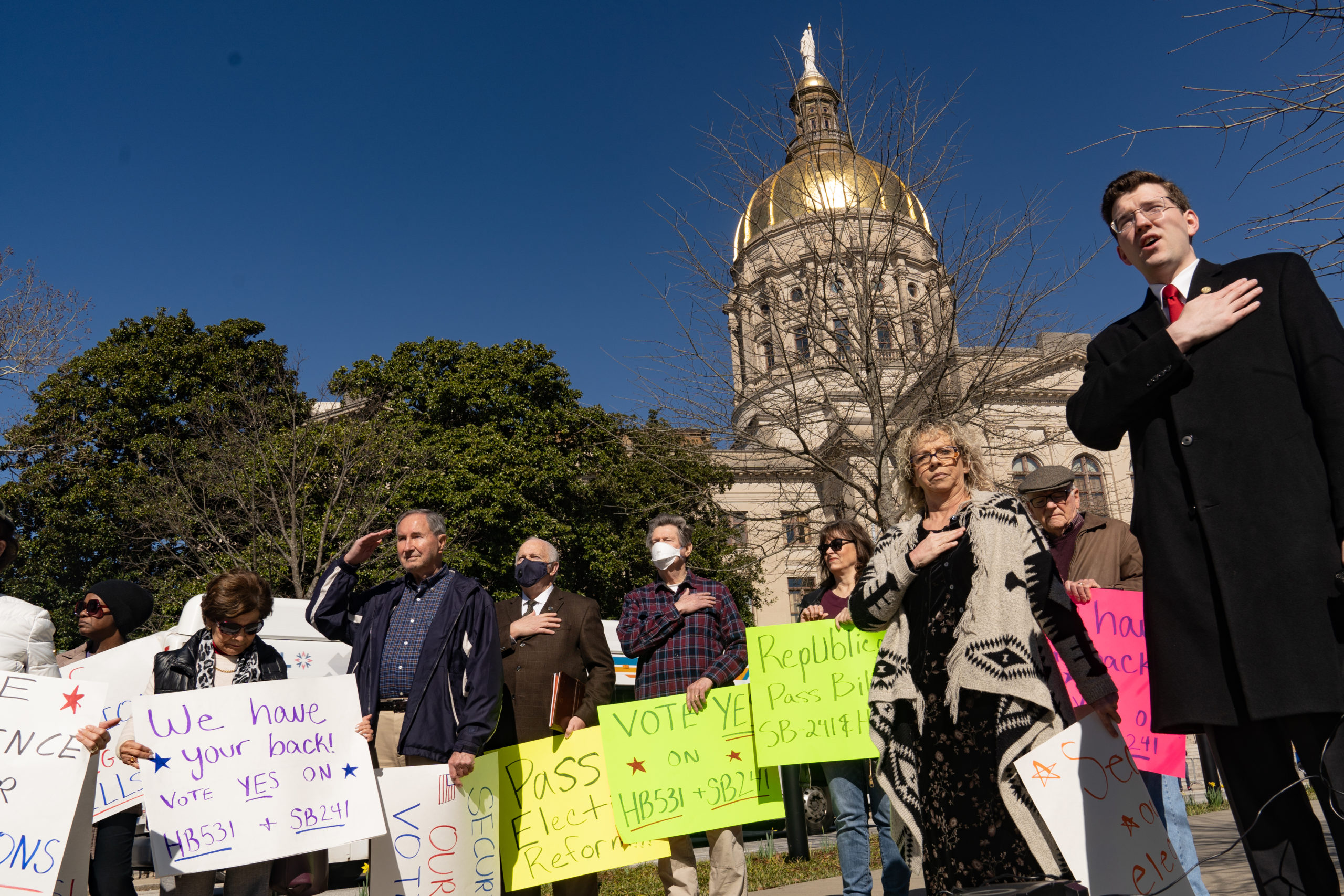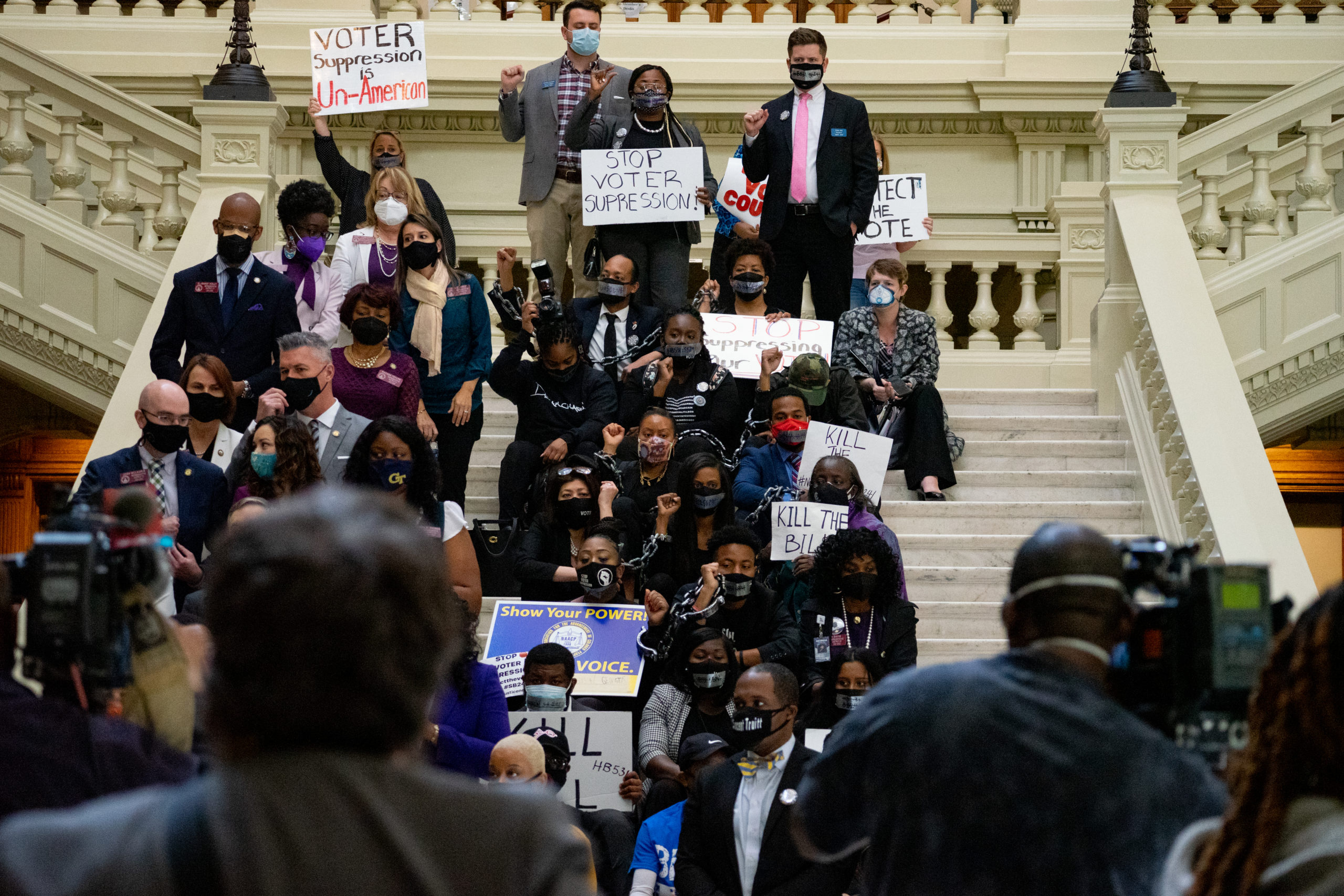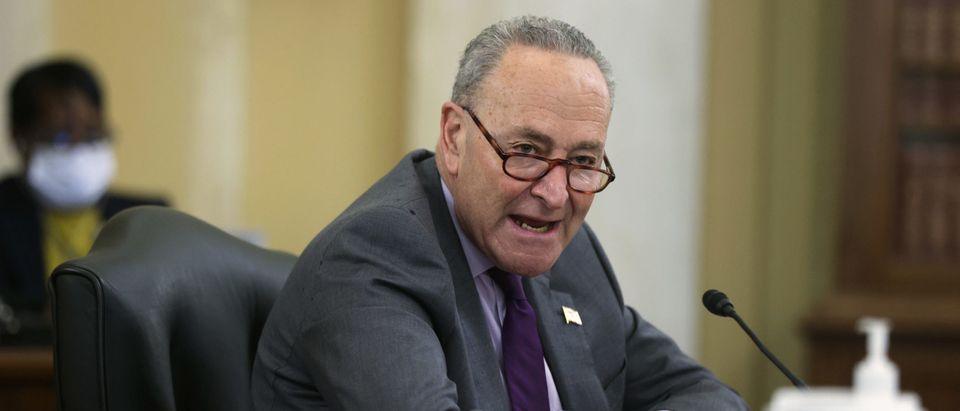- Democratic Sen. Chuck Schumer accused Georgia Republicans of seeking to eliminate weekend early voting, but his remarks left out crucial details.
- His remarks were delivered during a Senate Rules Committee hearing on H.R. 1, a Democratic voting rights bill. In his statement, the Senate majority leader lamented the efforts, calling them an “existential threat to democracy” that resembled laws of the Jim Crow era.
- The bill Georgia Gov. Brian Kemp signed into law Thursday evening requires early voting on both Saturdays during the state’s approximately three-week early voting period, and allows for localities to open the polls for two Sundays as well.
- Before Kemp signed the bill, localities only had to offer early voting on one of the two Saturdays, though they could open it on the other Saturday and both Sundays if they so chose. As a result, the final version of the bill did not necessarily restrict weekend voting relative to the law before.
Democratic Sen. Chuck Schumer accused Georgia Republicans of seeking to eliminate weekend early voting, but his remarks left out crucial details.
His remarks were delivered during a Senate Rules Committee hearing on H.R. 1, a Democratic bill meant to expand voting access that would federalize the electoral process, expand absentee voting nationwide, outlaw partisan gerrymandering and more. In his statement, the Senate majority leader lamented the efforts, calling them an “existential threat to democracy” that resembled laws of the Jim Crow era.
“[Georgia] Republicans recently passed a bill to eliminate early voting on Sunday, on Sunday, a day when many churchgoing African Americans participate in voter drives known as ‘Souls to the Polls,’” Schumer said. “What an astonishing coincidence. Outlaw voting on a day when African American churches sponsor get-out-the-vote efforts.”

Demonstrators show support of a bill that would add controversial voting restrictions to the state’s upcoming elections in Atlanta, Georgia. They include restricting ballot drop boxes, requiring an ID requirement for absentee voting and limiting weekend early voting days. (Megan Varner/Getty Images)
His claim, however, is only partially true. SB 202, which Georgia Gov. Brian Kemp signed into law Thursday evening, requires early voting on both Saturdays during the state’s approximately three-week early voting period, and allows for localities to open the polls for two Sundays as well.
Before Kemp signed the bill, however, localities only had to offer early voting on one of the two Saturdays, though they could open it on the other Saturday and both Sundays if they so chose. As a result, the final version of the bill did not necessarily restrict weekend voting relative to the law before. (RELATED: Georgia Bill Restricting Absentee Voting, Strengthening ID Requirements Passes State Senate)
Schumer’s testimony did align more with an earlier proposal in SB 202 and with a similar bill that would have restricted weekend voting but was since amended.
In the original version of a similar bill, titled HB 531, Georgia would have completely done away with Sunday voting, mirroring Schumer’s remarks, but one Sunday was later restored after widespread outcry. In an earlier version of SB 202 that failed to make it out of committee, local registrars were capped at offering just two days of early voting — either on the first Saturday or Sunday of the early voting period as well as the second Saturday, according to the Atlanta Journal-Constitution.

Demonstrators hold a sit-in inside of Georgia Capitol building in opposition of a Republican bill that would restrict early voting hours, remove drop boxes, and require the use of a government ID when voting by mail. (Photo by Megan Varner/Getty Images)
If SB 202 and HB 531 pass their respective chambers, then Georgia lawmakers would work out the respective differences between the bills before casting final votes.
Both bills, however, include multiple voting restrictions. They were introduced following months of former President Donald Trump and his allies falsely claiming that President Joe Biden’s victory was rigged, and have come under fire from Democrats and voting rights activists.
“This blatantly unconstitutional legislation will not go unchallenged,” Lauren Groh-Wargo, the CEO of the voting rights group Fair Fight Action, said on March 8 in response to HB 531. “It’s time for leaders across Georgia to step up and oppose this dangerous bill before it goes any further. We will continue to fight in Georgia, in the courts, and in Congress to make sure that Georgians’ voting rights are not infringed.”
SB 202 would slash the number of ballot drop boxes, set up a voter fraud hotline, require counties to finish counting ballots without pausing and make it illegal to give food or drinks to voters standing in line. It would also shorten the runoff period from nine to four weeks, meaning that future runoffs would take place in early December instead of January.
The bill would also strip the secretary of state and local election officials of their authority, and allow other state officials to replace local election officers if they deem them problematic.
All content created by the Daily Caller News Foundation, an independent and nonpartisan newswire service, is available without charge to any legitimate news publisher that can provide a large audience. All republished articles must include our logo, our reporter’s byline and their DCNF affiliation. For any questions about our guidelines or partnering with us, please contact licensing@dailycallernewsfoundation.org.


